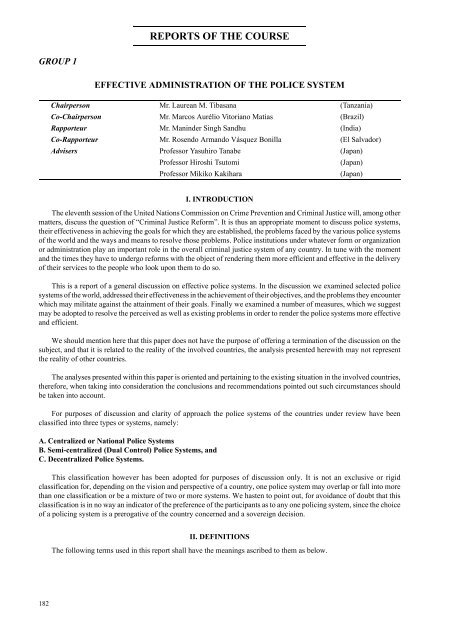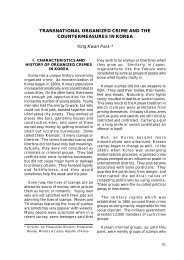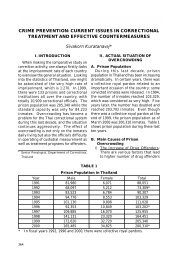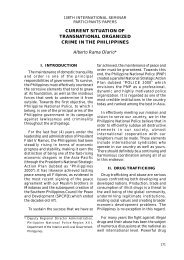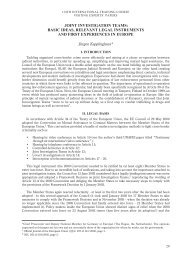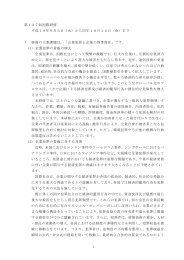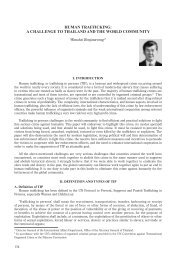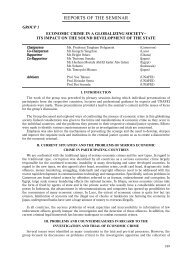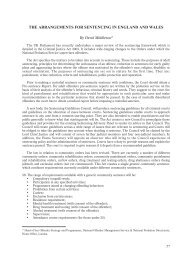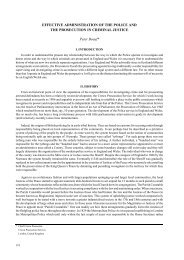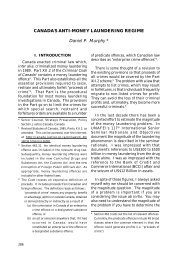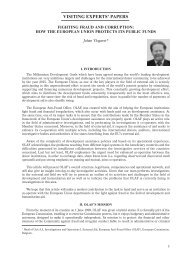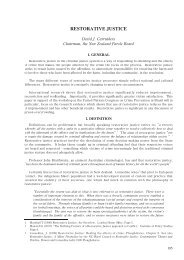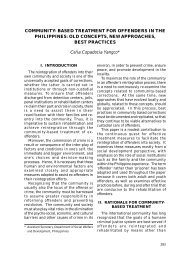Effective Administration of the Police System
Effective Administration of the Police System
Effective Administration of the Police System
Create successful ePaper yourself
Turn your PDF publications into a flip-book with our unique Google optimized e-Paper software.
REPORTS OF THE COURSEGROUP 1EFFECTIVE ADMINISTRATION OF THE POLICE SYSTEMChairperson Mr. Laurean M. Tibasana (Tanzania)Co-Chairperson Mr. Marcos Aurélio Vitoriano Matias (Brazil)Rapporteur Mr. Maninder Singh Sandhu (India)Co-Rapporteur Mr. Rosendo Armando Vásquez Bonilla (El Salvador)Advisers Pr<strong>of</strong>essor Yasuhiro Tanabe (Japan)Pr<strong>of</strong>essor Hiroshi Tsutomi(Japan)Pr<strong>of</strong>essor Mikiko Kakihara(Japan)I. INTRODUCTIONThe eleventh session <strong>of</strong> <strong>the</strong> United Nations Commission on Crime Prevention and Criminal Justice will, among o<strong>the</strong>rmatters, discuss <strong>the</strong> question <strong>of</strong> “Criminal Justice Reform”. It is thus an appropriate moment to discuss police systems,<strong>the</strong>ir effectiveness in achieving <strong>the</strong> goals for which <strong>the</strong>y are established, <strong>the</strong> problems faced by <strong>the</strong> various police systems<strong>of</strong> <strong>the</strong> world and <strong>the</strong> ways and means to resolve those problems. <strong>Police</strong> institutions under whatever form or organizationor administration play an important role in <strong>the</strong> overall criminal justice system <strong>of</strong> any country. In tune with <strong>the</strong> momentand <strong>the</strong> times <strong>the</strong>y have to undergo reforms with <strong>the</strong> object <strong>of</strong> rendering <strong>the</strong>m more efficient and effective in <strong>the</strong> delivery<strong>of</strong> <strong>the</strong>ir services to <strong>the</strong> people who look upon <strong>the</strong>m to do so.This is a report <strong>of</strong> a general discussion on effective police systems. In <strong>the</strong> discussion we examined selected policesystems <strong>of</strong> <strong>the</strong> world, addressed <strong>the</strong>ir effectiveness in <strong>the</strong> achievement <strong>of</strong> <strong>the</strong>ir objectives, and <strong>the</strong> problems <strong>the</strong>y encounterwhich may militate against <strong>the</strong> attainment <strong>of</strong> <strong>the</strong>ir goals. Finally we examined a number <strong>of</strong> measures, which we suggestmay be adopted to resolve <strong>the</strong> perceived as well as existing problems in order to render <strong>the</strong> police systems more effectiveand efficient.We should mention here that this paper does not have <strong>the</strong> purpose <strong>of</strong> <strong>of</strong>fering a termination <strong>of</strong> <strong>the</strong> discussion on <strong>the</strong>subject, and that it is related to <strong>the</strong> reality <strong>of</strong> <strong>the</strong> involved countries, <strong>the</strong> analysis presented herewith may not represent<strong>the</strong> reality <strong>of</strong> o<strong>the</strong>r countries.The analyses presented within this paper is oriented and pertaining to <strong>the</strong> existing situation in <strong>the</strong> involved countries,<strong>the</strong>refore, when taking into consideration <strong>the</strong> conclusions and recommendations pointed out such circumstances shouldbe taken into account.For purposes <strong>of</strong> discussion and clarity <strong>of</strong> approach <strong>the</strong> police systems <strong>of</strong> <strong>the</strong> countries under review have beenclassified into three types or systems, namely:A. Centralized or National <strong>Police</strong> <strong>System</strong>sB. Semi-centralized (Dual Control) <strong>Police</strong> <strong>System</strong>s, andC. Decentralized <strong>Police</strong> <strong>System</strong>s.This classification however has been adopted for purposes <strong>of</strong> discussion only. It is not an exclusive or rigidclassification for, depending on <strong>the</strong> vision and perspective <strong>of</strong> a country, one police system may overlap or fall into morethan one classification or be a mixture <strong>of</strong> two or more systems. We hasten to point out, for avoidance <strong>of</strong> doubt that thisclassification is in no way an indicator <strong>of</strong> <strong>the</strong> preference <strong>of</strong> <strong>the</strong> participants as to any one policing system, since <strong>the</strong> choice<strong>of</strong> a policing system is a prerogative <strong>of</strong> <strong>the</strong> country concerned and a sovereign decision.II. DEFINITIONSThe following terms used in this report shall have <strong>the</strong> meanings ascribed to <strong>the</strong>m as below.182
120TH INTERNATIONAL SENIOR SEMINARREPORTS OF THE COURSEA. Centralized <strong>Police</strong> <strong>System</strong> — Shall mean a police system in which <strong>the</strong>re is a national police agency or policeinstitution which is centrally commanded and controlled through a vertical chain <strong>of</strong> command and such police institutionhas unlimited jurisdiction throughout <strong>the</strong> territory <strong>of</strong> <strong>the</strong> country.B. Semi-Centralized <strong>Police</strong> <strong>System</strong> — Means a police system in a federal system <strong>of</strong> government or similarconstitutional arrangement where <strong>the</strong> responsibility for law and order is vested in <strong>the</strong> governments <strong>of</strong> <strong>the</strong> componentstates, provinces or prefectures and <strong>the</strong> control <strong>of</strong> <strong>the</strong> police agencies in <strong>the</strong> states, provinces or prefectures vests in both<strong>the</strong> Federal (Central) government as well as <strong>the</strong> governments <strong>of</strong> <strong>the</strong> component states, provinces or prefectures irrespective<strong>of</strong> <strong>the</strong> extent and measure <strong>of</strong> control exercised by ei<strong>the</strong>r organ.C. Decentralized <strong>Police</strong> <strong>System</strong> — Means a police system in a federal, union or similar form <strong>of</strong> political orconstitutional arrangement, where responsibility for law and order and consequently <strong>the</strong> operational control, management,and superintendence <strong>of</strong> <strong>the</strong> police agencies or institutions is <strong>the</strong> exclusive responsibility <strong>of</strong> <strong>the</strong> governments <strong>of</strong> <strong>the</strong> statesor provinces; components <strong>of</strong> <strong>the</strong> federal or union arrangement as <strong>the</strong> case may be.III. CLASSIFICATION OF THE POLICE SYSTEMSNations have varying police systems. Some countries like Chile, El Salvador, Indonesia, Kenya, Malaysia, Nepal,Papua New Guinea, Tanzania, Thailand and Uganda have centrally controlled or national police systems. Generally suchcountries are characterized by a single designated national police chief who has overall command, superintendence andmanagement <strong>of</strong> <strong>the</strong> national police agency. Some countries like Brazil and Japan have Semi-centralized or dually controlledpolice systems. Generally in such countries national bodies in <strong>the</strong> form <strong>of</strong> Public Safety commissions or similar form <strong>of</strong>designation exercise indirect powers <strong>of</strong> supervision over police agencies in <strong>the</strong> states or prefectures through appointmentsand <strong>the</strong> formulation <strong>of</strong> policies while <strong>the</strong> operational command and control remains <strong>the</strong> responsibility <strong>of</strong> <strong>the</strong> states,prefectures or provinces. Some countries like India and Pakistan have decentralized police systems. In such countrieslaw and order is a state subject and consequently <strong>the</strong> operational command and control <strong>of</strong> <strong>the</strong> police agencies in <strong>the</strong> statesis <strong>the</strong> exclusive responsibility <strong>of</strong> <strong>the</strong> state governments concerned while <strong>the</strong> role <strong>of</strong> <strong>the</strong> central (national) government islimited to financial support only.A. Countries With a Centralized (National) <strong>Police</strong> <strong>System</strong>1. ChileThe Political Constitution <strong>of</strong> <strong>the</strong> Republic <strong>of</strong> Chile states that The Forces <strong>of</strong> Order and Public Security comprise <strong>the</strong>Carabineros de Chile and Policia de Investigaciones. Accordingly <strong>the</strong> Chilean police forces are entrusted with lawenforcement, public order and internal security throughout <strong>the</strong> country. The Forces <strong>of</strong> Order and Public Security fallunder <strong>the</strong> Ministry <strong>of</strong> National Defence.2. El SalvadorAccording to <strong>the</strong> Constitution <strong>of</strong> <strong>the</strong> Republic <strong>of</strong> El Salvador <strong>the</strong> responsibility to maintain public security and internalpeace throughout <strong>the</strong> country is assigned to <strong>the</strong> Civil National <strong>Police</strong> (Policia Nacional Civil — PNC), which is headedby a General Director, appointed by <strong>the</strong> President <strong>of</strong> <strong>the</strong> Republic.For <strong>the</strong> past ten years, due to peace agreements signed after <strong>the</strong> war <strong>the</strong> PNC has been under several ministries(Ministry <strong>of</strong> Interior and Public Security, Ministry <strong>of</strong> Public Security and by a recent reorganization <strong>the</strong> newly createdMinistry <strong>of</strong> Government).3. IndonesiaThe national police force <strong>of</strong> Indonesia comes under <strong>the</strong> <strong>of</strong>fice <strong>of</strong> <strong>the</strong> President. It is headed by <strong>the</strong> Chief <strong>of</strong> IndonesianNational <strong>Police</strong> with <strong>the</strong> rank <strong>of</strong> General, who is assisted by subordinate commanders deployed in formations and unitsthroughout <strong>the</strong> country and answerable to <strong>the</strong> <strong>Police</strong> General.4. KenyaThe Kenya <strong>Police</strong> Force comes under <strong>the</strong> President’s <strong>of</strong>fice. It has jurisdiction throughout <strong>the</strong> whole country and isheaded by <strong>the</strong> Commissioner <strong>of</strong> <strong>Police</strong>, assisted by three Senior Deputy Commissioners responsible for <strong>Administration</strong>,<strong>the</strong> Criminal Investigation Department and <strong>the</strong> General Service Unit.183
120TH INTERNATIONAL SENIOR SEMINARREPORTS OF THE COURSEunder <strong>the</strong> jurisdiction <strong>of</strong> <strong>the</strong> Cabinet <strong>of</strong>fice and <strong>the</strong> National <strong>Police</strong> Agency. The National Public Safety Commissionissues general guidelines, and appoints <strong>the</strong> Commissioner General <strong>of</strong> National police Agency, as well as o<strong>the</strong>r senior<strong>of</strong>ficials <strong>of</strong> <strong>the</strong> prefectural police organizations. Public Safety and <strong>the</strong> policing <strong>of</strong> <strong>the</strong> prefectures is vested in <strong>the</strong> respectiveprefectures. The National Public Safety Commission however exercises indirect supervisory power over policing activitiesin <strong>the</strong> prefectures through <strong>the</strong> National <strong>Police</strong> Agency.C. Countries With Decentralized <strong>Police</strong> <strong>System</strong>1. IndiaThe Constitution <strong>of</strong> <strong>the</strong> Republic <strong>of</strong> India designates law and order as a state subject. The police agencies in <strong>the</strong> 28states are under <strong>the</strong> control <strong>of</strong> <strong>the</strong> respective state governments. However <strong>the</strong> police force in <strong>the</strong> 07 Union Territory<strong>Administration</strong>s function under <strong>the</strong> Ministry <strong>of</strong> Home Affairs <strong>of</strong> <strong>the</strong> central government, which also control specializedinvestigation agency, <strong>the</strong> CBI — Central Bureau <strong>of</strong> Investigation, as well as several central police organizations, whichare <strong>of</strong>ten deployed to assist <strong>the</strong> state police in <strong>the</strong> event <strong>of</strong> emergency. The Central Government’s role is restricted to <strong>the</strong>financial support <strong>of</strong> <strong>the</strong> states and <strong>the</strong> issue <strong>of</strong> general administrative guidelines and policies.2. PakistanUnder <strong>the</strong> Federal Constitution <strong>of</strong> <strong>the</strong> Islamic Republic <strong>of</strong> Pakistan police and consequently law and order is aprovincial subject. Each <strong>of</strong> <strong>the</strong> four provinces has its own police agency. The provincial police agencies are headed byan <strong>of</strong>ficer with <strong>the</strong> rank <strong>of</strong> Inspector General appointed by <strong>the</strong> provincial government who is answerable to <strong>the</strong> respectiveprovincial government for <strong>the</strong> proper administration <strong>of</strong> <strong>the</strong> police agency. The Federal Government’s role in relation to<strong>the</strong> provincial police force is limited to <strong>the</strong> issuing <strong>of</strong> general policy guidelines while <strong>the</strong> operational control remains in<strong>the</strong> provincial government.IV. PROBLEMS IDENTIFIED IN RELATION TO THE POLICE SYSTEMA. Budgetary Problems Affecting EfficiencyProper recruitment, selection, education and training <strong>of</strong> <strong>of</strong>ficers are important aspects to be considered in respect <strong>of</strong>policing. Moreover, police <strong>of</strong>ficers engaged in police duties under law enforcement agencies require to be supplied witho<strong>the</strong>r particular logistic items, such as: equipment, vehicles, weaponry, uniforms and reasonable pay, etc.There are two stages in a police <strong>of</strong>ficer’s career: First, when <strong>the</strong>y are training in a police academy or school; and,second, <strong>the</strong> life that starts when <strong>the</strong>y incorporate and go to work dealing with crime. In both <strong>of</strong> <strong>the</strong>se cases, <strong>the</strong>re areinsufficient budgetary appropriations by governments or institutions in charge.Even when most <strong>of</strong> its needs are satisfactorily supplied, <strong>the</strong> budget is not enough for <strong>the</strong> police to provide <strong>the</strong> welfareconditions for <strong>the</strong>ir families, as for good education, security and access to health, a good pay, good pension and adequaterest time.If <strong>the</strong>se needs are fulfilled we could expect optimum efficiency from <strong>the</strong> entire law enforcement organ.B. Lack <strong>of</strong> Training1. QualificationAs a matter <strong>of</strong> fact, many police <strong>of</strong>ficers are never involved in a crisis situation, most <strong>of</strong> <strong>the</strong>m never fire a gun in <strong>the</strong>line <strong>of</strong> duty. Much <strong>of</strong> <strong>the</strong>ir time is spent in routine activities related to social services, such as attending domestic brawls,etc, as some research studies have indicated.Many police agencies do not focus <strong>the</strong>ir training on important qualities, because <strong>the</strong>y assume <strong>the</strong>ir personnel havedeveloped <strong>the</strong>se skills prior to joining <strong>the</strong> agency. For instance, many law enforcement <strong>of</strong>ficers have deficient skills inrelation to tact, physical courage, emotional stability, impartiality and honesty.2. EducationWhat level <strong>of</strong> education is most appropriate for a new entrant to join a police agency is a sensitive and controversialissue.185
RESOURCE MATERIAL SERIES No. 60Although, it might be assumed that higher education is important, that is not necessarily <strong>the</strong> case as research studieshave indicated. However, education increases police <strong>of</strong>ficers’ sensitivity and gives additional qualities to face problemson duty.3. TrainingIn fact, many fields <strong>of</strong> training focused on technical courses are wasted because <strong>the</strong>y are neglected. In o<strong>the</strong>r casesmany police <strong>of</strong>ficers are trained on particular law enforcement and o<strong>the</strong>r pr<strong>of</strong>essional skills but <strong>the</strong>y are not being deployedto areas that require and can use <strong>the</strong>ir new skills and knowledge.C. Lack <strong>of</strong> CooperationIn many cases, <strong>the</strong>re is a lack <strong>of</strong> cooperation between police agencies or between departments within a same agencydue to;1. Creation <strong>of</strong> too much bureaucracy in police organizations because each section perceives itself as better than <strong>the</strong> o<strong>the</strong>r,2. Lack <strong>of</strong> technology to share information, especially when it needs scientific methods to collect, collate <strong>of</strong>ficial dataand put it to appropriate use. That is why collecting <strong>of</strong>ficial data and using <strong>the</strong>m is difficult,3. They think that developing secrecy is one <strong>of</strong> <strong>the</strong>ir most effective sources <strong>of</strong> power and to share such informationwould weaken <strong>the</strong>ir power base.D. CorruptionIn fact, most misbehaviour by police <strong>of</strong>ficers does not differ significantly from <strong>the</strong> normal citizens’ conduct, however,people expect much more from police; and many people think that police corruption is pervasive within <strong>the</strong> organization.It is impossible to deny that corruption exists among police agencies at various levels <strong>of</strong> magnitude. Many police <strong>of</strong>ficersare subjected to such strong pressures to which <strong>the</strong>y succumb and become corrupt. In some countries corruption ischaracterized by <strong>the</strong> following factors;1. Acts <strong>of</strong> corruption are not exposed due to a kind <strong>of</strong> “Code <strong>of</strong> Silence” among <strong>of</strong>ficers,2. Some <strong>of</strong>ficers are charged with acts <strong>of</strong> <strong>the</strong>ft and violation <strong>of</strong> drug related laws,3. The media occasionally reveals that even <strong>the</strong> highest-ranking <strong>of</strong>ficers have participated in cases <strong>of</strong> corruption, more<strong>of</strong>ten in drug related cases,4. There are two types <strong>of</strong> corrupt police <strong>of</strong>ficers, on one hand <strong>the</strong>re are those who take bribes routinely from organizedcrime gangs in order to protect such criminal gangs from arrest and prosecution, on <strong>the</strong> o<strong>the</strong>r hand <strong>the</strong>re are thosewho take bribes occasionally and persistently keep seeking opportunities to demand and take bribes. In both cases,i.e. <strong>the</strong> regular bribe takers and <strong>the</strong> occasional bribe takers become dependant on corruption for <strong>the</strong>ir life styles.E. Arbitrary External InterferenceThis is a difficult matter to deal with, because it involves real problems within <strong>the</strong> police system. In fact, arbitraryexternal interference symbolizes abuse <strong>of</strong> power be it by <strong>the</strong> government, high-ranking <strong>of</strong>ficers or influential peoplewithin <strong>the</strong> political or social set up <strong>of</strong> a country.As a matter <strong>of</strong> fact, those who seek to exert arbitrary influence view <strong>the</strong>mselves to be above <strong>the</strong> law. As a result,powerful people can commit serious crimes using police institutions. In many cases it ends up as a violation <strong>of</strong> civilrights. Even while society is determined to make reforms to improve <strong>the</strong> independence <strong>of</strong> <strong>the</strong> police system, unfortunatelyin several countries, <strong>the</strong> police is forced to abandon <strong>the</strong>ir roles <strong>of</strong> law enforcement, order maintenance and service.F. Lack <strong>of</strong> PersonnelIn many situations, some countries are facing crime without <strong>the</strong> required quality and quantity <strong>of</strong> police <strong>of</strong>ficers. Buteven when <strong>the</strong> quality attained is <strong>of</strong> a high level <strong>the</strong>re are not enough personnel to perform such police functions, asga<strong>the</strong>ring information, attending crime scenes, inspecting victimised premises and performing o<strong>the</strong>r tasks needed toregister criminal complaints. Sometimes many people do not feel attracted to become police <strong>of</strong>ficers, as <strong>the</strong>re areinsufficient incentives to do so. However, in most cases, <strong>the</strong> problem is <strong>the</strong> budget. Irrespective <strong>of</strong> <strong>the</strong> type <strong>of</strong> policingsystem lack <strong>of</strong> personnel affects efficiency and effectiveness.186
120TH INTERNATIONAL SENIOR SEMINARREPORTS OF THE COURSEG. Lack <strong>of</strong> AccountabilityPeople may lose confidence in a police agency for various reasons. Loss <strong>of</strong> confidence is not occurring in all countries,however it is affecting those countries that have problems dealing with corruption, abuse <strong>of</strong> power and institutionalcrimes. It is hard to trust police <strong>of</strong>ficers whose private lives are not in conformity with <strong>the</strong>ir pr<strong>of</strong>essional ethics. In <strong>the</strong>same way, people are not going to have accountability when those who are in charge <strong>of</strong> law enforcement, break <strong>the</strong> rules,even it be relatively inconsequential rules like jumping a red light.Common people do not tolerate excessive use <strong>of</strong> force, even if police use <strong>of</strong> force is lawful. In addition, lack <strong>of</strong>accountability is likely to increase in case police agencies do not emphasize community relations, if <strong>the</strong>y embracecorruption and failure to observe exemplary private life styles among some <strong>of</strong> <strong>the</strong> police <strong>of</strong>ficers.V. CONCEIVABLE MEASURESA. Budgetary ConstraintsThe constraint <strong>of</strong> budget is one <strong>of</strong> <strong>the</strong> factors that can effect many areas <strong>of</strong> <strong>the</strong> police organizations, leading up tosituations that inevitably harm police effectiveness, such as: lack <strong>of</strong> skills, caused by insufficient training; lack <strong>of</strong>appropriate or insufficiency <strong>of</strong> equipment, and lack <strong>of</strong> logistic support, which deteriorates <strong>the</strong>ir operational capacity andaffects <strong>the</strong> police <strong>of</strong>ficer’s motivation; as well as low pay, which in <strong>the</strong> same way leads to lack <strong>of</strong> motivation <strong>of</strong> personnel,and as a reflection makes <strong>the</strong> police service less attractive for recruitment <strong>of</strong> personnel.Insufficient budgetary allocation for supporting police needs and expenses is commonly found in countries undersevere conditions <strong>of</strong> social and economical development.Besides being a result <strong>of</strong> <strong>the</strong> establishment <strong>of</strong> administrative and governmental priorities, <strong>the</strong> shortage <strong>of</strong> budgetaryallocation for police forces, as a matter <strong>of</strong> fact, also seems to be related to <strong>the</strong> economic capacity <strong>of</strong> <strong>the</strong> country.In this sense, for <strong>the</strong> purpose <strong>of</strong> providing satisfactory financial support for police forces, special attention by <strong>the</strong>Government is required, in order to fairly attend <strong>the</strong> institutional needs <strong>of</strong> <strong>the</strong> police, <strong>the</strong> social expectations on publicsafety and <strong>the</strong> sustainment <strong>of</strong> <strong>the</strong> required level <strong>of</strong> provision <strong>of</strong> service to <strong>the</strong> people.B. Accountability <strong>of</strong> <strong>the</strong> <strong>Police</strong>The awesome powers given to <strong>the</strong> police must be matched with <strong>the</strong> proper system <strong>of</strong> accountability to ensure that<strong>the</strong> powers given to <strong>the</strong> police are not misused. The way accountability is enforced presently is very diffused and vague.Presently <strong>the</strong>re is no outside assessment <strong>of</strong> various aspects related to <strong>the</strong> functions <strong>of</strong> <strong>the</strong> police in order to determinewhe<strong>the</strong>r police is efficient and effective.The responsible ministries or o<strong>the</strong>r bodies under which <strong>the</strong> police fall have nei<strong>the</strong>r <strong>the</strong> expertise nor wherewithal andsometimes not even <strong>the</strong> time to properly evaluate <strong>the</strong> working <strong>of</strong> <strong>the</strong> police. In some countries commissions, like <strong>the</strong>human rights commission, or commission for women only look into specific aspects <strong>of</strong> police work. Therefore <strong>the</strong>re isa need for periodical inspections <strong>of</strong> <strong>the</strong> police to be carried out by an independent governmental organ, similar to HerMajesty’s Inspectorate <strong>of</strong> Constabulary, in <strong>the</strong> UK, and report to <strong>the</strong> concerned ministry whe<strong>the</strong>r <strong>the</strong> police is functioningefficiently and effectively. The head <strong>of</strong> <strong>the</strong> police would be required to <strong>of</strong>fer his comments on <strong>the</strong> reports <strong>of</strong> such anorgan. Thereafter <strong>the</strong>se reports should be published and laid before <strong>the</strong> Legislature.To enable <strong>the</strong> designated organ to assess <strong>the</strong> work <strong>of</strong> <strong>the</strong> police <strong>the</strong> government should define a certain limited number<strong>of</strong> key objectives for <strong>the</strong> police force to be accomplished during <strong>the</strong> year. Similarly for each police formation or unitcertain local key objectives should be defined. To assess <strong>the</strong> performance <strong>of</strong> <strong>the</strong> formation or unit certain performanceindicators/indices need to be developed and proper information on those needs to be ga<strong>the</strong>red on <strong>the</strong> basis <strong>of</strong> surveys.Proper evaluation criteria should be developed to judge <strong>the</strong> performance <strong>of</strong> a formation or a subdivision <strong>of</strong> it, up to<strong>the</strong> lowest level, e.g. a police station. Similarly, <strong>the</strong>re is a need to evolve proper evaluation criteria to judge <strong>the</strong> performance<strong>of</strong> individual <strong>of</strong>ficers who head <strong>the</strong>se formations or units. The evaluation criteria need to be understood by all members<strong>of</strong> <strong>the</strong> police and published for information.Complaint Authorities should be set up in accordance with <strong>the</strong> customs and practice <strong>of</strong> each country, preferablyheaded by persons with judicial experience. Investigation into all complaints against police would in <strong>the</strong> first instance,be done by <strong>the</strong> superiors in <strong>the</strong> police department or agency itself. Those who do not find satisfaction can approach <strong>the</strong>187
RESOURCE MATERIAL SERIES No. 60Local Complaint Authority, which should have power to direct <strong>the</strong> police to reinvestigate <strong>the</strong> complaints. There shouldbe a mandatory judicial inquiry into all cases <strong>of</strong>: alleged rape <strong>of</strong> a woman in police custody, and death <strong>of</strong> suspects whilein police custody.Transparency <strong>of</strong> police agencies is important in order to win <strong>the</strong> confidence <strong>of</strong> <strong>the</strong> citizens <strong>the</strong>y serve. <strong>Police</strong> agenciesshould <strong>the</strong>refore establish an internal section or department whose function among o<strong>the</strong>r should be to release informationon a routine basis regarding actions taken by <strong>the</strong> police against <strong>of</strong>ficers engaging in acts <strong>of</strong> misconduct.C. Arbitrary Political InterferenceArbitrary external and political influence is an unfortunate reality in many countries. The level <strong>of</strong> interference variesfrom country to country but all in all where it takes place, it leads <strong>the</strong> police forces to deviate from <strong>the</strong> public interest. Itis one <strong>of</strong> <strong>the</strong> factors that certainly cause inefficiency and ineffectiveness in <strong>the</strong> functioning <strong>of</strong> <strong>the</strong> police.In democratic states <strong>the</strong> principal functions <strong>of</strong> <strong>the</strong> police forces are to enforce <strong>the</strong> law and <strong>the</strong> protection <strong>of</strong> <strong>the</strong>community, acting according to <strong>the</strong> rule <strong>of</strong> law. For this purpose <strong>the</strong> police have to function under <strong>the</strong> politicians, in orderto receive guidance and keep <strong>the</strong> sense <strong>of</strong> orientation on <strong>the</strong> public interest. On <strong>the</strong> o<strong>the</strong>r hand, politicians are <strong>the</strong> onesentrusted to get <strong>the</strong> views and aspirations <strong>of</strong> <strong>the</strong> people, playing <strong>the</strong> role <strong>of</strong> issuing general policies, on behalf <strong>of</strong> <strong>the</strong>people’s interest.As a distortion <strong>of</strong> what is mentioned, <strong>the</strong>re are instances where politicians take advantage <strong>of</strong> <strong>the</strong> police forces, bygetting <strong>the</strong>m to act for private or personal interests. As <strong>the</strong> police is normally one part <strong>of</strong> <strong>the</strong> executive branch <strong>of</strong> <strong>the</strong>government, functioning under <strong>the</strong> politicians and consequently in a relation <strong>of</strong> hierarchical obedience, it becomes aneasy way to intervene internally in <strong>the</strong> police forces. In addition, <strong>the</strong> selection <strong>of</strong> <strong>the</strong> police chiefs is normally made under<strong>the</strong> discretion <strong>of</strong> one individual politician.<strong>Police</strong> forces are, in this sense, highly vulnerable to external pressures, particularly those <strong>of</strong> a political nature, dueto <strong>the</strong> fact that <strong>the</strong> police chiefs are subordinated to <strong>the</strong> political authorities that have put <strong>the</strong>m in <strong>the</strong> position <strong>the</strong>y arevested in. In such circumstances a vitiated relationship might be set, as <strong>the</strong> police heads may feel morally in debt to <strong>the</strong>politicians and obliged to do particular favors for <strong>the</strong>m. In cases where <strong>the</strong> police chief refuses to stoop to this kind <strong>of</strong>relationship he will <strong>the</strong>n be likely to be removed.In several countries, in addition to nomination <strong>of</strong> <strong>the</strong> police chiefs, political authorities are also given <strong>the</strong> power todecide promotions and posting <strong>of</strong> high ranking <strong>of</strong>ficers, as well as to determine disciplinary sanctions; such powers enable<strong>the</strong>m to strongly interfere in police matters in several ways.As a result, some police institutions are affected in <strong>the</strong>ir performance, in situations such as: frequently posting andremoval <strong>of</strong> personnel, harming <strong>the</strong> continuity <strong>of</strong> programmes and actions; unreasonable political recommendations thatharm <strong>the</strong>ir recruitment processes, leading <strong>the</strong>m to incorporate personnel with low or unsuitable qualifications; makingdecisions on promotions based on political criteria, ra<strong>the</strong>r than <strong>the</strong> evaluation <strong>of</strong> <strong>the</strong> performance and o<strong>the</strong>r legalrequirements; misuse <strong>of</strong> <strong>the</strong> police force for attending personal or private and political purposes; as well as unlawfulinterference in investigations and directions given to <strong>the</strong> police forces.Since it is obliged to strictly take <strong>the</strong> rule <strong>of</strong> law into account, as matter <strong>of</strong> principle, police must stand apart frompolitics. On <strong>the</strong> contrary, what has been seen in some countries is a tightening <strong>of</strong> <strong>the</strong> relationship between politics andpolice, and a steady increase <strong>of</strong> <strong>the</strong> politicization <strong>of</strong> police <strong>of</strong>ficers.When police organizations have deviated from <strong>the</strong>ir real objectives, it is most likely <strong>the</strong>y will experience decliningstandards <strong>of</strong> <strong>the</strong>ir component units and individual police <strong>of</strong>ficers. Such a situation leads invariably to public outragemanifested in diverse ways.Certainly <strong>the</strong> solution to <strong>the</strong> problem <strong>of</strong> external and political arbitrary interference is not easy work, however itcould be appropriate to consider <strong>the</strong> invigoration <strong>of</strong> <strong>the</strong> police organizations and an increase <strong>of</strong> its autonomy, as relevantinputs in this regard.In this sense, <strong>the</strong> central idea is to keep <strong>the</strong> police functions insulated from external and arbitrary pressures, by way<strong>of</strong> providing structural safeguards, in order to ensure that <strong>the</strong> police functions are conducted strictly in accordance to <strong>the</strong>law. The executive branch may have demands in regard <strong>of</strong> preventive police actions and issue guidance on administrative/188
120TH INTERNATIONAL SENIOR SEMINARREPORTS OF THE COURSEregulatory functions <strong>of</strong> <strong>the</strong> police; however, <strong>the</strong> investigative functions <strong>of</strong> police should be totally preserved from anyexternal interference. Presently in some instances investigations <strong>of</strong> cases involving high political and governmentalauthorities, and o<strong>the</strong>r VIPs, can not succeed, due to <strong>the</strong> existing control over <strong>the</strong> police apparatus.<strong>Police</strong> <strong>of</strong>ficers must be shielded from undesirable and unwanted interference in posting and transfers. There must besome neutral mechanism to ensure it. In this regard, <strong>the</strong> adoption <strong>of</strong> a police organization in which <strong>the</strong> control over <strong>the</strong>police by <strong>the</strong> executive branch is exercised by way <strong>of</strong> an organ that can ensure its impartiality and political neutralityseems to be <strong>the</strong> most important recommendation.For that purpose, <strong>the</strong> Japanese police system based on political neutrality and democratic control is fit for consideration,as it is built in such a way as to ensure absence <strong>of</strong> arbitrary and political interference. This system may be suitable forsome countries in ei<strong>the</strong>r its entirety or with minor modifications.The following is a brief description <strong>of</strong> <strong>the</strong> main characteristics <strong>of</strong> <strong>the</strong> Japanese police system: 1“The National Public Safety Commission and <strong>the</strong> National <strong>Police</strong> Agency constitute Japan’s national policeorganization. The National Public Safety Commission exercises administrative supervision over <strong>the</strong> National<strong>Police</strong> Agency. While <strong>the</strong> Commission is under <strong>the</strong> jurisdiction <strong>of</strong> <strong>the</strong> Cabinet Office, <strong>the</strong> Prime Minister is notempowered to exercise direct command or control. This guarantees <strong>the</strong> Commission’s independence and ensuresits political neutrality.The Commission formulates basic policies and regulations, coordinates police administration on matters <strong>of</strong>national concern and authorizes general standards for training, communication, criminal identification, criminalstatistics and equipment.The Commission appoints <strong>the</strong> National <strong>Police</strong> Agency’s Commissioner General and o<strong>the</strong>r senior <strong>of</strong>ficials <strong>of</strong>prefectural police organization. The Commission indirectly supervises prefectural police organizations through<strong>the</strong> National <strong>Police</strong> Agency.The Commission consists <strong>of</strong> a Chairman and five members. The chairman is a state minister who presides overCommission meetings. Members, who serve five-year term, are appointed by <strong>the</strong> Prime Minister with <strong>the</strong> consent<strong>of</strong> both houses <strong>of</strong> <strong>the</strong> Diet. They must be persons who have not served as police <strong>of</strong>ficers or public prosecutorswithin five years <strong>of</strong> appointment. To ensure political neutrality, no more than two members may belong to <strong>the</strong>same political party.”Providing a reasonable tenure for <strong>of</strong>ficers at senior levels is an important step to improve police performance. Inorder to ensure that <strong>the</strong> <strong>of</strong>fice <strong>of</strong> <strong>the</strong> police is independent, ano<strong>the</strong>r recommendation that could be considered is to grantsecurity <strong>of</strong> <strong>the</strong> tenure for <strong>the</strong> police chiefs, at national and state/provincial level. By way <strong>of</strong> having a fixed tenure <strong>the</strong>police chiefs will have no fear in <strong>the</strong> exercise <strong>of</strong> <strong>the</strong>ir functions, as <strong>the</strong>y do not have to be under <strong>the</strong> threat <strong>of</strong> beingtransferred or removed. Clear provisions should however be laid down for <strong>the</strong> removal from <strong>of</strong>fice <strong>of</strong> police chiefs. Theyshould be removable for unsuitability or o<strong>the</strong>r causes or proven misconduct.This treatment is similar to what is done for <strong>the</strong> prosecution service in various countries, where prosecutors are givencertain prerogatives such that <strong>the</strong>y may be removed only under certain circumstances.In Japan, for instance, prosecutors may only be removed in circumstances, such as: voluntary resignation, reachingretirement age, found unsuitable for <strong>the</strong> position by <strong>the</strong> public prosecutors qualifications examinations committee, anddisciplinary action. O<strong>the</strong>r countries such as Germany and Brazil, similarly, have successfully granted strong prerogativesfor prosecutors, in order to immunize <strong>the</strong>m from external influence.Matters <strong>of</strong> promotions and disciplinary actions related to police chiefs and high rank police <strong>of</strong>ficers in order to insulate<strong>the</strong>m from external and political arbitrary interference should be dealt with by a constituted organ (as per <strong>the</strong> previousrecommendation), which exercises control over <strong>the</strong> police. In <strong>the</strong> same way, this measure aims to streng<strong>the</strong>n <strong>the</strong> selfconfidence<strong>of</strong> police chiefs and police <strong>of</strong>ficers in order to keep <strong>the</strong> functioning <strong>of</strong> <strong>the</strong> police according to <strong>the</strong> rule <strong>of</strong> law,with no fear <strong>of</strong> retaliation.1Text extracted from <strong>the</strong> magazine <strong>Police</strong> <strong>of</strong> Japan 2001, issued by <strong>the</strong> National <strong>Police</strong> Agency <strong>of</strong> Japan, page 02.189
RESOURCE MATERIAL SERIES No. 60D. Politicization <strong>of</strong> <strong>Police</strong> OfficersIt has to be mentioned that <strong>the</strong> politicization <strong>of</strong> police <strong>of</strong>ficers can strongly harm <strong>the</strong> performance <strong>of</strong> <strong>the</strong> policeagencies. In this context <strong>the</strong> intrusion <strong>of</strong> politics into police forces may give rise to negative consequences. Among suchnegative consequences: police <strong>of</strong>ficers showing lack <strong>of</strong> pr<strong>of</strong>essional standards, more concerned with <strong>the</strong>ir own interests;lack <strong>of</strong> commitment with police duties and low level <strong>of</strong> discipline, resulting in a weak chain <strong>of</strong> command.The gravity <strong>of</strong> <strong>the</strong> involvement <strong>of</strong> politics into police forces can be more clearly understood if <strong>the</strong> perceived connectionbetween politicians and organized crime is taken into consideration. In this regard <strong>the</strong> existing police apparatus cannotoppose such kinds <strong>of</strong> coalition, when <strong>the</strong> police itself is already contaminated.E. <strong>Police</strong> Corruption<strong>Police</strong> corruption is widely accepted as being a matter <strong>of</strong> concern on police management, since police <strong>of</strong>ficers areknown to serve in a very sensitive and peculiar environment, subjecting <strong>the</strong>m to ra<strong>the</strong>r potentially corrupting situations.However, corruption is not considered an endemic occurrence in some countries.The causes <strong>of</strong> corruption <strong>of</strong> police <strong>of</strong>ficers in addition to <strong>the</strong> environmental conditions <strong>of</strong> <strong>the</strong> police service are alsorelated to o<strong>the</strong>r circumstances, such as: lack <strong>of</strong> ethical standards, which is <strong>the</strong> foundation <strong>of</strong> pr<strong>of</strong>essional conduct; longperiods <strong>of</strong> service exercising <strong>the</strong> same functions, which makes an <strong>of</strong>ficer develop overrated self confidence in his/herown capacity; social environmental conditions; as well as low level <strong>of</strong> training and education.<strong>Police</strong> corruption, understood as <strong>the</strong> dishonesty within <strong>the</strong> law enforcement function, is <strong>the</strong> conduit pipe throughwhich criminalization and politicization <strong>of</strong> police <strong>of</strong>ficers passes. It is a complex and harmful situation, which requiresspecial attention <strong>of</strong> police management at <strong>the</strong> governmental level, since its occurrence leads to <strong>the</strong> development <strong>of</strong> mistrust<strong>of</strong> <strong>the</strong> police organization.In this regard, for purposes <strong>of</strong> improving <strong>the</strong> situation, some practical measures are recommended, as follows:1. Ethical standardsThe establishment <strong>of</strong> internal regulations on ethics set up by a code <strong>of</strong> conduct for police stipulating <strong>the</strong> standardsexpected <strong>of</strong> <strong>the</strong> police and its <strong>of</strong>ficers in <strong>the</strong> performance <strong>of</strong> <strong>the</strong>ir duties is highly necessary. Such provision shouldemphasize honesty, dedication to duty, exemplary behavior in public, service to people, <strong>the</strong> rights <strong>of</strong> private citizens andhuman rights. Such provisions should also put in place <strong>the</strong> necessary sanctions to be imposed in case <strong>of</strong> misconduct. Theadministration <strong>of</strong> <strong>the</strong> disciplinary sanctions should be charged to senior police <strong>of</strong>ficers within <strong>the</strong> police department.It would also be necessary that a similar code <strong>of</strong> conduct, both for <strong>the</strong> government servants as well as <strong>the</strong> electedrepresentatives at <strong>the</strong> various levels be provided, as well as strictly enforced, and not remain on paper only.2. TrainingBy way <strong>of</strong> proper training <strong>the</strong> Code <strong>of</strong> Conduct and its ethical values have to be drilled into <strong>the</strong> minds <strong>of</strong> policepersonnel during <strong>the</strong> initial training as well as in-service training. As part <strong>of</strong> <strong>the</strong> continuous training <strong>of</strong> <strong>the</strong> police regularethics courses should also be conducted.3. PunishmentThe punishment for proven corruption should be dismissal from service and nothing less. Assets acquired throughcorrupt means need to be forfeited. Procedures for holding departmental enquiries should be simple and fast.4. Social/Economical support<strong>Police</strong> <strong>of</strong>ficers have to be granted reasonable conditions for supporting <strong>the</strong>ir individual and family needs; withparticular attention to <strong>the</strong> lower ranking police <strong>of</strong>ficers’ working conditions, living conditions, such as: proper housing,schooling for <strong>the</strong>ir children and medical assistance.5. O<strong>the</strong>r measuresMaking it compulsory to file annual property returns by all ranks <strong>of</strong> police, which after submission are scrutinizedand analyzed properly would make it unattractive for police <strong>of</strong>ficers to amass wealth through corruption.To improve in-house vigilance, confidential reports on supervising <strong>of</strong>ficers should contain a paragraph regardingefforts made by <strong>the</strong> <strong>of</strong>ficer to control and curb corruption in <strong>the</strong> subordinate staff.190
120TH INTERNATIONAL SENIOR SEMINARREPORTS OF THE COURSERegular inspections, visits and supervision by senior <strong>of</strong>ficers should be done in order to discourage various forms<strong>of</strong> police misconduct and acts <strong>of</strong> indiscipline.Occupational deviance, like <strong>the</strong> falsification <strong>of</strong> evidence, planting <strong>of</strong> evidence in order to secure conviction shouldbe discouraged and perpetrators <strong>of</strong> such acts should be punished in accordance with <strong>the</strong> disciplinary code.<strong>Police</strong> agencies serve in given contextual settings. In situations where police corruption is pervasive it is also possiblethat acts <strong>of</strong> corruption exist in o<strong>the</strong>r sectors <strong>of</strong> <strong>the</strong> public service. This calls upon a holistic approach to fight corruptionin o<strong>the</strong>r sectors <strong>of</strong> <strong>the</strong> public service. Countries should <strong>the</strong>refore consider seriously <strong>the</strong> setting up <strong>of</strong> independent anticorruptionorgans/agencies to investigate acts <strong>of</strong> corruption among <strong>the</strong> o<strong>the</strong>r members <strong>of</strong> <strong>the</strong> public service.F. Lack <strong>of</strong> TrainingTraining is at <strong>the</strong> very heart <strong>of</strong> effective and responsible policing. While a lot <strong>of</strong> lip service is paid to it, in reality itis a ra<strong>the</strong>r neglected area. Training institutions are not given <strong>the</strong> importance <strong>the</strong>y deserve nor <strong>the</strong> resources <strong>the</strong>y require.A very small percentage <strong>of</strong> <strong>the</strong> total police budget is spent on training. It is mostly unwanted persons who are posted toa training institute, on occasions as punishment posting. Lack <strong>of</strong> interest on <strong>the</strong> part <strong>of</strong> police chiefs in <strong>the</strong> matter <strong>of</strong>training and <strong>the</strong> budgetary constraint, are <strong>the</strong> major inhibiting factors. Training should not be treated as an end in itself.The real challenge is to translate <strong>the</strong> best possible training into <strong>the</strong> best possible police performance.There has to be a co-relation between training undergone by <strong>the</strong> <strong>of</strong>ficer and his posting. No <strong>of</strong>ficer should be postedto a new discipline unless he has undergone <strong>the</strong> requisite training. Promotion should be linked to <strong>the</strong> training and passing<strong>of</strong> certain departmental examinations. As such training should not be considered as once-in-lifetime affair at <strong>the</strong> beginning<strong>of</strong> <strong>the</strong> career. In-service training needs to be given greater attention. There is a need for total reorientation in <strong>the</strong> approachfor training. All training needs to be subdivided in two areas: one that is basic, is motivational; value based which enhancesdiscipline and communications skills; <strong>the</strong> second area <strong>of</strong> training should have its objectives, acquisition <strong>of</strong> specializedskills and pr<strong>of</strong>essional expertise. Training in both <strong>the</strong>se areas toge<strong>the</strong>r should achieve two purposes, namely: an attitudinaltransformation and development <strong>of</strong> skills.Each police chief should constitute an in-house “committee on training”. The committee should prepare a panel <strong>of</strong>competent trainers without whom <strong>the</strong> training programme would receive a set back.<strong>Police</strong> behavior, image, public relations and efficiency are inter-related areas. Of this, police behavior is <strong>the</strong> mostvital parameter and critical variant causing positive or negative impact on <strong>the</strong> remaining three areas. <strong>Police</strong> in each countryshould adopt <strong>the</strong> concept <strong>of</strong> “change-agent-action plan” like a part <strong>of</strong> <strong>the</strong> UNDP (United Nations Development Programme)project on Improving <strong>the</strong> Organization and Law Enforcement <strong>System</strong> and train <strong>the</strong> required number <strong>of</strong> change agents atvarious levels <strong>of</strong> police hierarchy. More international cooperation including funding is required to boost <strong>the</strong> trainingprogrammes in <strong>the</strong> developing countries.The impact <strong>of</strong> training needs to be evaluated properly. There should be a method <strong>of</strong> such evaluation <strong>of</strong> each personwho has undergone a training programme at <strong>the</strong> end <strong>of</strong> one year after <strong>the</strong> training. Relevant entries should be made in<strong>the</strong> <strong>of</strong>ficers’ evaluation report by <strong>the</strong> superior <strong>of</strong>ficer about <strong>the</strong> use <strong>of</strong> skills acquired in <strong>the</strong> training.There must be greater emphasis on joint training <strong>of</strong> <strong>of</strong>ficers belonging to various components <strong>of</strong> <strong>the</strong> criminal justicesystem. Such joint training programmes, including participants from police, prosecution, judiciary, correctionalinstitutions and prison are very useful for effective coordination and development <strong>of</strong> mutual understanding among <strong>the</strong>various wings <strong>of</strong> <strong>the</strong> system. Perhaps it would be still more useful if some members <strong>of</strong> <strong>the</strong> community with relevantexpertise who are in a position to give good feedback about police work are also included in <strong>the</strong> joint training programmesas participants as well as guest lecturers or resource persons as <strong>the</strong> case may be.Facilities available at police training institutes need to be up dated. The need for improving <strong>the</strong> infrastructure at <strong>the</strong>training institutes, improving <strong>the</strong> quality <strong>of</strong> trainers and provision <strong>of</strong> incentive to trainers is to be recognized andimplemented with proper allocation <strong>of</strong> budget.G. The Role <strong>of</strong> <strong>Police</strong> AssociationsIn some countries <strong>Police</strong> Associations bringing toge<strong>the</strong>r various levels <strong>of</strong> police <strong>of</strong>ficers have been established, whichhave played a considerable role in <strong>the</strong> improvement <strong>of</strong> <strong>the</strong> conditions <strong>of</strong> service for police <strong>of</strong>ficers, and raising ethical191
RESOURCE MATERIAL SERIES No. 60standards, which has in turn raised <strong>the</strong> <strong>of</strong>ficers’ morale and consequently <strong>the</strong>ir efficiency. There is however no practiceor custom <strong>of</strong> establishing such associations in some countries and <strong>the</strong>refore this recommendation may be <strong>of</strong> limited utility.Hence we recommend that in <strong>the</strong> countries where local custom, practice or law permits <strong>the</strong> establishment <strong>of</strong> policeassociations, consideration should be given to establishing <strong>the</strong>m, so that <strong>the</strong>y may assist in various areas <strong>of</strong> police reform.192


